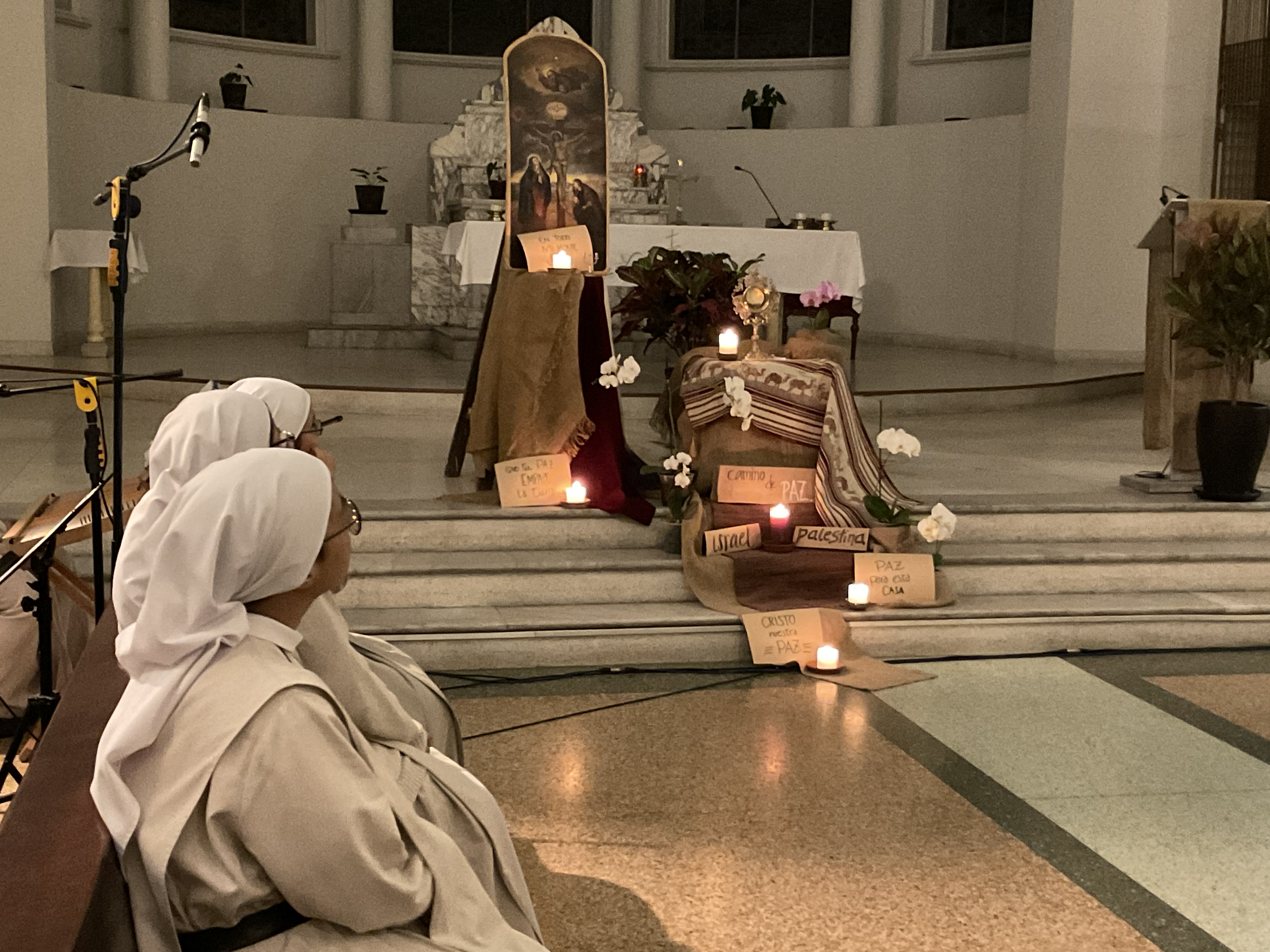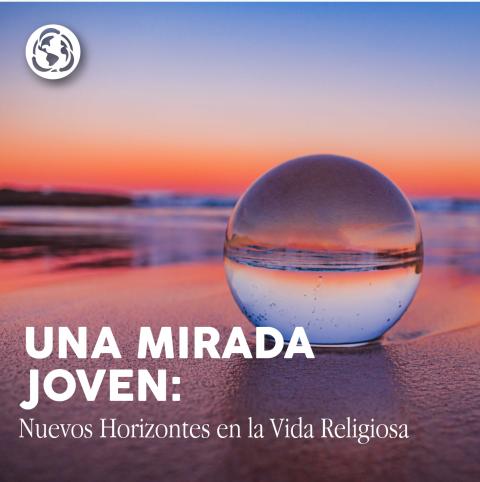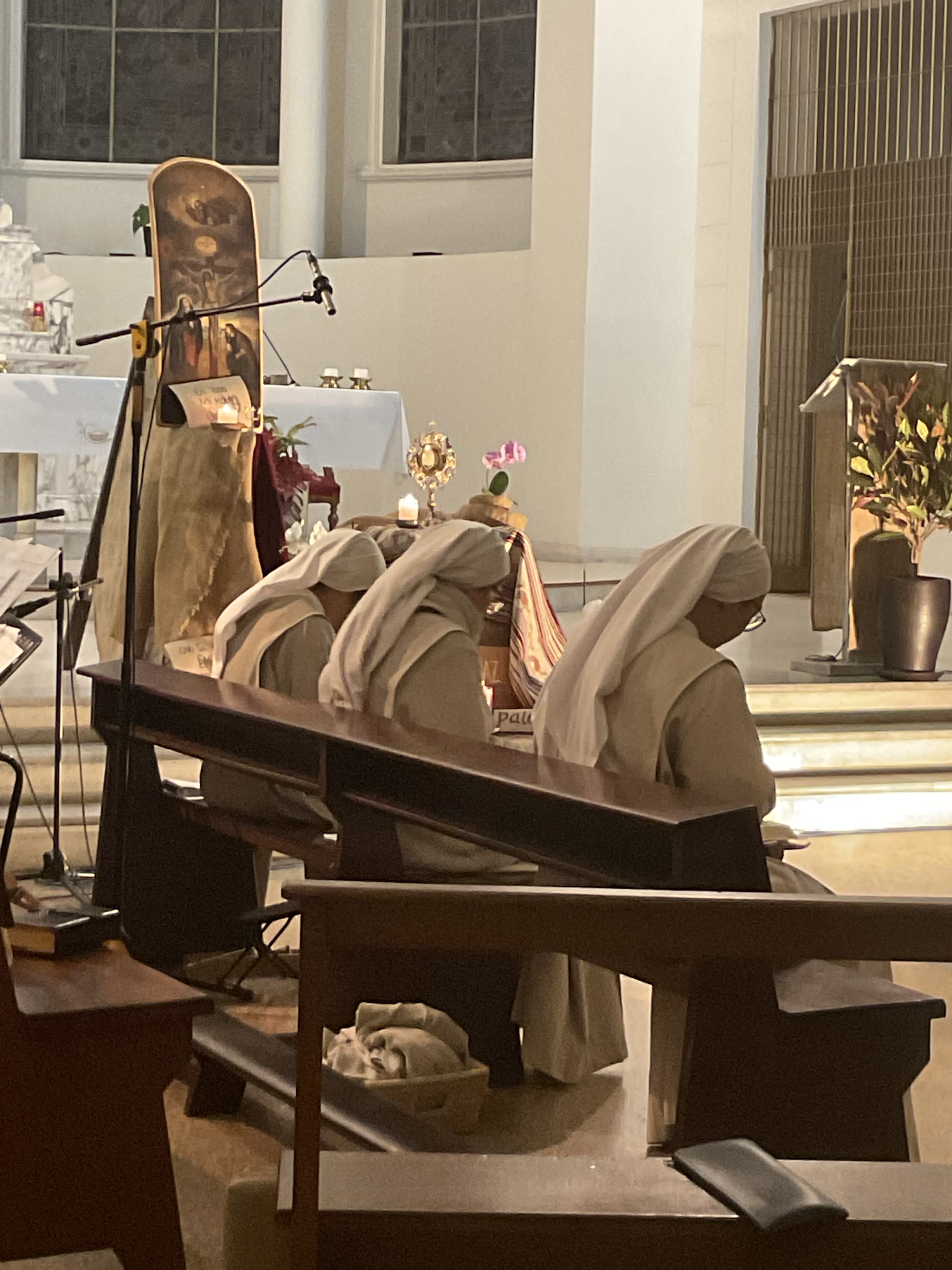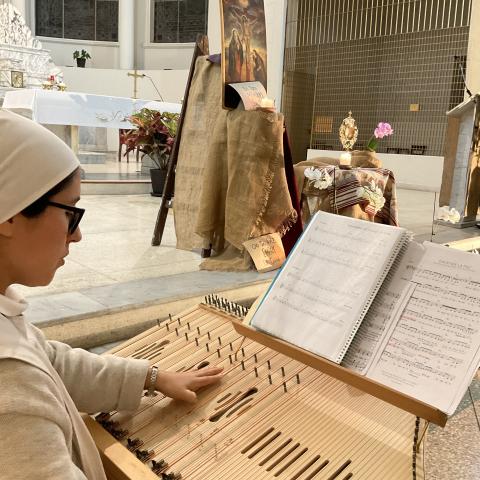
Augustinian Sisters pray for peace during the day of fasting and prayer called by Pope Francis on Oct. 17 at the Monastery of the Incarnation, Lima, Peru. (Begoña Costillo)
The news concerning the crisis in Israel and Palestine is devastating. The sight of desperate Gazans escaping the mousetrap that Gaza has become is terrifying. It is so painful to witness children dying, women crying, and men killing each other. The city's ruins, increasingly resembling an inferno, are desolate.
This conflict annihilating the holy land of God — the birthplace of the first civilizations and the place where the dialogue between men and the one God of the Abrahamic religions began — is madness.

The once-fertile crescent, now a place of death, was also the cradle of life and faith. It was in that good land, watered by the abundant flow of great rivers and nourished by the culture and wisdom of the people of the East, that the human community found its first stable unity.
There, more than 5,000 years before Christ, the desire to live together sharing the same language, culture, laws and gods finally matured. God spoke to Abraham there, promising a land whose value was not only in a portion of territory, but in the abundant life that would spring from the coexistence among people and between them and God — a precious inheritance for descendants: "Through you, all peoples will be blessed" (Genesis 12:3). A blessing in itself expansive, because it was destined to reach everyone and to multiply, in that diffusion, its richness and its gifts, its religious depth and its human height.
Therefore, it is poignant that now, in the same place where God sought men and promised them life, death now reigns as if God were absent. The efficacy of the blessing lies in its connection to the bestower — the One who breathes life into it and governs its essence. Conversely, it transforms into a curse when a community asserts itself as the exclusive chosen people, assuming ownership and lordship over the divine promise, proclaiming singular holiness.
We sisters of the community have joined the day of fasting and prayer for peace called by Pope Francis to intercede for the cessation of violence between Israel and Palestine.

Prayer for peace in the Church of the Monastery of the Incarnation on Oct. 17 (Begoña Costillo)
From very early on, Jews, Muslims and Christians, the three sons of Abraham, have fought with blood for that holy land, blurring the lines between the sacred and the profane, the voice of God and the interests of men.
Thus began a history of death in which we have all taken part to the point of configuring a complex and dangerous geopolitical scenario that mirrors the complex inner world of every human being. We are all more or less distant descendants of Abraham or, in any case, we are among those to whom the divine light that Israel received was to be shared: "The peoples shall walk in your light" (Isaiah 60:3). And we too want our share of land, our wealth, our security, our well-being, and we defend it with violence if necessary.
It may be the politicians who call for war and procure the weapons, but we all, in one way or another, contribute to the adversarial dynamic where the other becomes a hindrance to my personal interests. There are moments when we all lean toward fighting rather than accepting defeat, and killing rather than dying. In doing so, we inadvertently fuel the vast machinery of hatred among brethren, gradually escalating to global heights.
It is poignant that now, in the same place where God sought men and promised them life, death now reigns as if God were absent.
More than borders are at stake in this conflict. At stake are the depths of human desire. While an inherent love for fellow human beings and God exists — a desire to live in communion with them — an opposing impulse surfaces. This counter desire seeks singularity, a self-centered life, the removal of anyone perceived as limiting, and the pursuit of wealth and prosperity at the expense of others.
Violence is the victory of this self-centered desire. This war, like those in Ukraine, Sudan and Ethiopia, is a global external manifestation of our internal hatreds.

A sister performs the psalter during a day of prayer for peace at the Church of the Monastery of the Incarnation in Lima, Peru, Oct. 17. (Begoña Costillo)
For this reason, the sisters in my community have participated in the day of fasting and prayer for peace initiated by Pope Francis. This involvement is not only to intercede for the cessation of violence between Israel and Palestine but also to delve into the core of our desires, to attentively listen to the violence residing in our minds, to review the battles for which we bear responsibility, and ultimately to empathize with our brethren who are dying. In doing so, we acknowledge that, in various ways, we too contribute to eliminating those who hinder us.
Together, as sisters and with the whole church, we offer our prayers, seeking a new heart, similar to that of Jesus, who has turned every evil desire into authentic love — a love that relinquishes all claims in favor of others, defends from evil with the strength of goodness, and extends love even to enemies. Ultimately, it is a love that willingly chooses self-sacrifice over taking a life.







